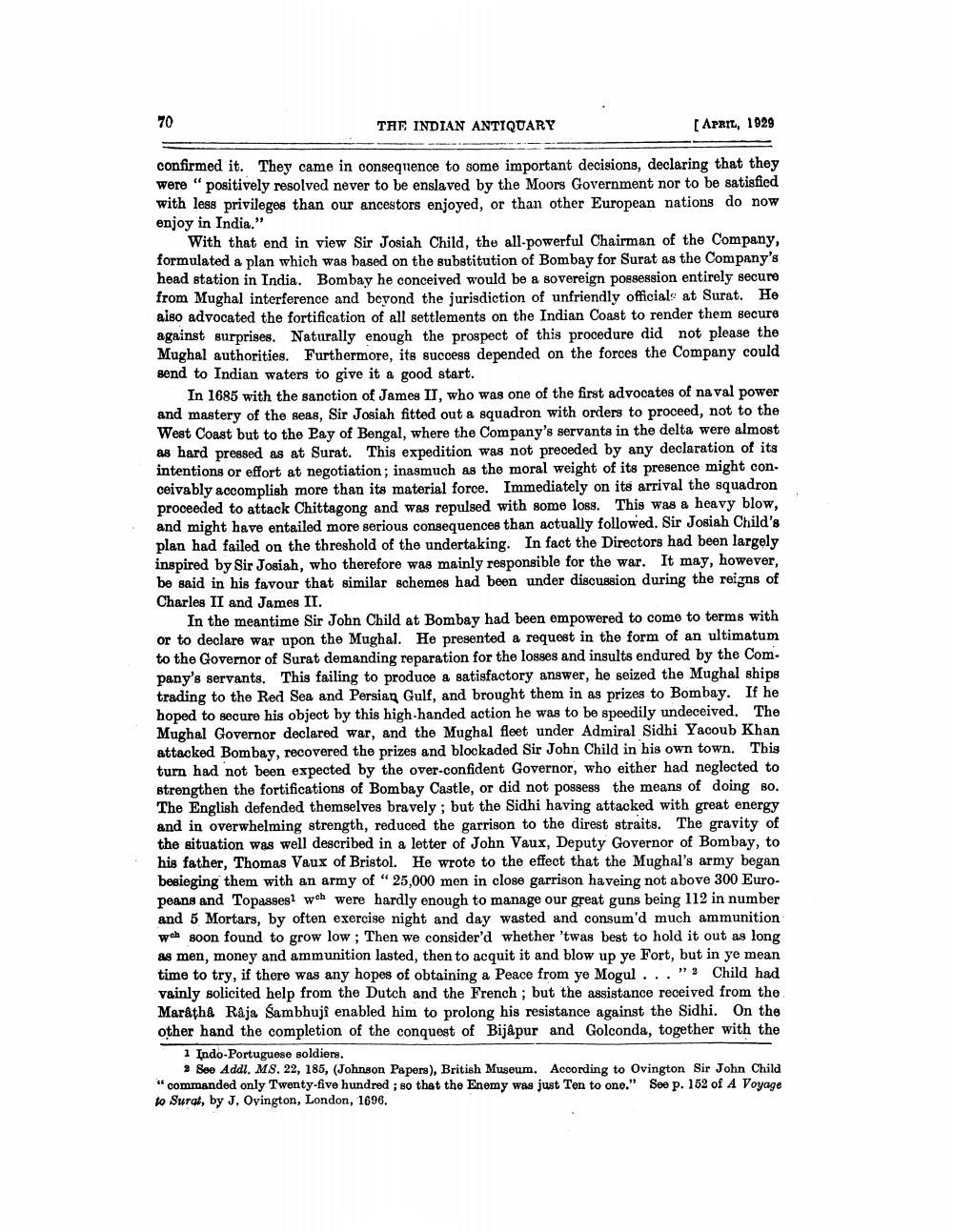________________
THE INDIAN ANTIQUARY
[APRIL, 1929
confirmed it. They came in conseqnence to some important decisions, declaring that they were" positively resolved never to be enslaved by the Moors Government nor to be satisfied with less privileges than our ancestors enjoyed, or than other European nations do now enjoy in India."
With that end in view Sir Josiah Child, the all-powerful Chairman of the Company, formulated a plan which was based on the substitution of Bombay for Surat as the Company's head station in India. Bombay he conceived would be a sovereign possession entirely secure from Mughal interference and beyond the jurisdiction of unfriendly officials at Surat. He also advocated the fortification of all settlements on the Indian Coast to render them secure against surprises. Naturally enough the prospect of this procedure did not please the Mughal authorities. Furthermore, its success depended on the forces the Company could send to Indian waters to give it a good start.
In 1685 with the sanction of James II, who was one of the first advocates of naval power and mastery of the seas, Sir Josiah fitted out a squadron with orders to proceed, not to the West Coast but to the Bay of Bengal, where the Company's servants in the delta were almost as hard pressed as at Surat. This expedition was not preceded by any declaration of its intentions or effort at negotiation; inasmuch as the moral weight of its presence might conceivably accomplish more than its material force. Immediately on its arrival the squadron proceeded to attack Chittagong and was repulsed with some loss. This was a heavy blow, and might have entailed more serious consequences than actually followed. Sir Josiah Child's plan had failed on the threshold of the undertaking. In fact the Directors had been largely inspired by Sir Josiah, who therefore was mainly responsible for the war. It may, however, be said in his favour that similar schemes had been under discussion during the reigns of Charles II and James II.
In the meantime Sir John Child at Bombay had been empowered to come to terms with or to declare war upon the Mughal. He presented a request in the form of an ultimatum to the Governor of Surat demanding reparation for the losses and insults endured by the Com. pany's servants. This failing to produce a satisfactory answer, he seized the Mughal ships trading to the Red Sea and Persian Gulf, and brought them in as prizes to Bombay. If he hoped to secure his object by this high-handed action he was to be speedily undeceived. The Mughal Governor declared war, and the Mughal fleet under Admiral Sidhi Yacoub Khan attacked Bombay, recovered the prizes and blockaded Sir John Child in his own town. This turn had not been expected by the over-confident Governor, who either had neglected to strengthen the fortifications of Bombay Castle, or did not possess the means of doing so. The English defended themselves bravely; but the Sidhi having attacked with great energy and in overwhelming strength, reduced the garrison to the direst straits. The gravity of the situation was well described in a letter of John Vaux, Deputy Governor of Bombay, to his father, Thomas Vaux of Bristol. He wrote to the effect that the Mughal's army began besieging them with an army of " 25,000 men in close garrison haveing not above 300 Europeans and Topasses! wch were hardly enough to manage our great guns being 112 in number and 5 Mortars, by often exercise night and day wasted and consum'd much ammunition wch soon found to grow low; Then we consider'd whether 'twas best to hold it out as long As men, money and ammunition lasted, then to acquit it and blow up ye Fort, but in ye mean time to try, if there was any hopes of obtaining a Peace from ye Mogul..." 3 Child had vainly solicited help from the Dutch and the French ; but the assistance received from the Maratha Raja Sambhuji enabled him to prolong his resistance against the Sidhi. On the other hand the completion of the conquest of Bijapur and Golconda, together with the
1 Indo-Portuguese soldiers.
? See Addl. MS. 22, 185, (Johnson Papers), British Museum. According to Ovington Sir John Child "commanded only Twenty-five hundred; so that the Enemy was just Ton to one." See p. 162 of 4 Voyage to Surat, by J, Ovington, London, 1696.




